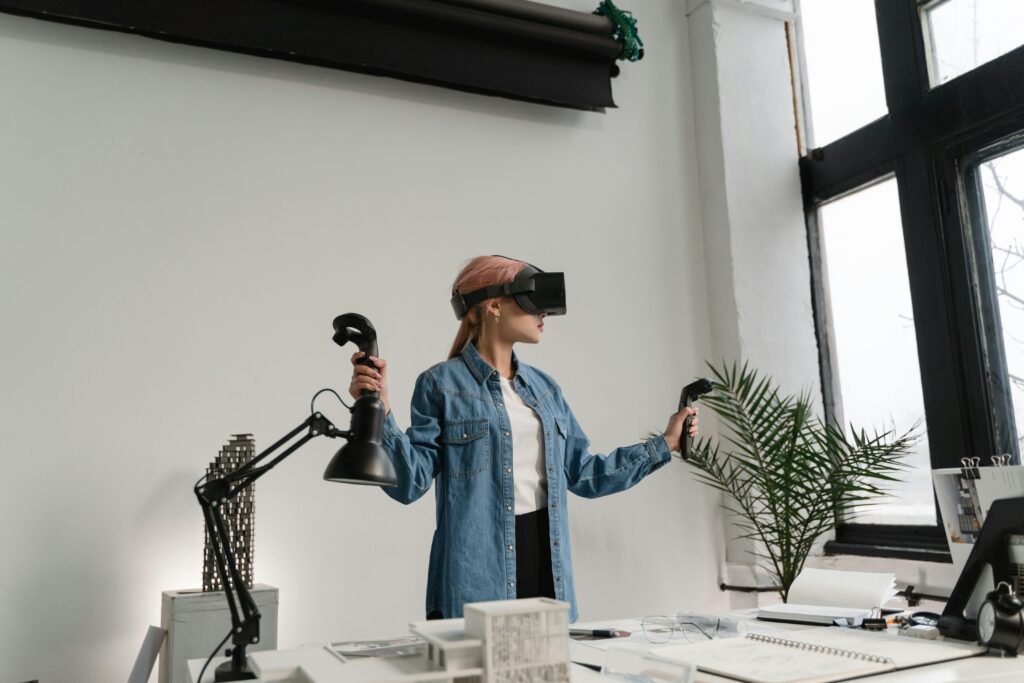The concept of reality has expanded beyond the physical world into immersive experiences powered by virtual reality (VR), augmented reality (AR), and artificial intelligence (AI). These technologies are not just reshaping entertainment and gaming but are deeply impacting healthcare, education, real estate, and digital investments.
This revolution in reality offers lucrative opportunities for entrepreneurs, investors, and content creators looking to align themselves with high CPC AdSense keywords and long-term trends.
In this comprehensive guide, you will learn:
- What modern “reality” means
- How VR is creating immersive business and personal experiences
- How AR is enhancing industries from shopping to healthcare
- The role of AI in building and shaping realities
- The transformation of real estate in the AR/VR age
- Challenges and ethical concerns
- Actionable ways to profit from these trends
What is Reality in the Age of Technology?
Reality once meant tangible, observable, and verifiable environments. Now, it includes:
- Virtual Reality (VR): Entirely digital environments experienced via headsets.
- Augmented Reality (AR): Overlaying digital information on the physical world using smartphones or AR glasses.
- Artificial Intelligence (AI): Creating hyper-realistic digital experiences, simulations, and content generation.
- Digital Twins: Virtual replicas of real-world objects and systems for analysis, design, and training.
The blending of digital and physical realities is not only redefining personal experiences but is creating a trillion-dollar economy.
Virtual Reality: Building New Worlds and Economies
1️⃣ VR in Gaming and Entertainment
Gaming remains the largest VR market driver:
- Meta Quest 3, PlayStation VR2, and HTC Vive lead headset markets.
- VR games like Beat Saber and Half-Life: Alyx showcase immersive potential.
- Social VR platforms like VRChat and Rec Room allow socialization within virtual spaces.
2️⃣ VR in Business and Collaboration
Companies are using VR for:
- Virtual meetings and conferences
- Product design and prototyping
- Employee onboarding and skills training
By reducing travel costs and improving collaboration, VR enhances productivity.
3️⃣ VR in Education
VR enables:
- Virtual labs for science learning
- History re-creations for immersive study
- Language learning in simulated environments
4️⃣ VR in Healthcare
Healthcare is leveraging VR for:
- Pain management
- Phobia and PTSD treatment
- Surgeon training simulations
- Stroke rehabilitation therapy
High CPC Keywords:
- VR healthcare apps
- VR therapy programs
- medical VR training
Augmented Reality: Enhancing the Physical World
AR integrates digital information into the real world, transforming how we:
- Shop (virtual try-ons)
- Navigate (AR-enhanced maps)
- Learn (AR in education)
- Receive medical treatment (AR-assisted surgeries)
AR in Retail
Retailers use AR for:
- Try-before-you-buy clothing and makeup
- Visualizing furniture in homes
- Interactive AR ads
High CPC Keywords:
- AR shopping apps
- AR retail marketing
- AR eCommerce tools
AR in Healthcare
Doctors use AR for:
- Visualizing organs during surgeries
- Training medical students with 3D models
- Patient education for complex conditions
High CPC Keywords:
- AR medical training
- AR surgery tools
AR in Navigation and Maintenance
AR-powered apps allow:
- Step-by-step maintenance instructions overlaying real objects
- Enhanced driving assistance with AR HUDs
- AR mapping and indoor navigation
Artificial Intelligence: The Engine Powering Reality
AI fuels the AR/VR revolution by:
- Content Generation: AI can create realistic environments, objects, and simulations.
- Personalization: AI tailors AR/VR experiences to user behavior.
- Analytics: AI analyzes VR/AR user interactions for improvement.
- Virtual Influencers: AI-generated influencers now model clothes, products, and create branded content.
AI also enables voice-controlled navigation within VR environments and generates lifelike avatars for meetings, therapy, and customer support.
High CPC Keywords:
- AI content generation tools
- AI in AR/VR
- AI in healthcare solutions
- AI-driven marketing
Real Estate in the Age of Reality Technologies
Virtual Tours and Staging
VR allows buyers to:
- Virtually tour homes anywhere globally
- Experience different furniture arrangements through VR staging
- Explore properties under development
AR for Real Estate
AR enables:
- On-site property enhancements with overlays
- Visualization of future home extensions
- Displaying live neighborhood data during tours
AI in Real Estate
AI analyzes:
- Property valuations
- Market trends for profitable investments
- Rental yield predictions
Virtual Real Estate
Platforms like Decentraland, The Sandbox, and Otherside allow purchasing virtual plots of land where brands and individuals create:
- Virtual stores
- Event spaces
- Advertisements
High CPC Keywords:
- real estate AI analytics
- virtual property investment
- VR real estate tours
- AR for real estate marketing
High CPC Monetization Opportunities
If you run a blog, YouTube channel, or digital business, these trends open high-paying AdSense niches:
✅ VR headset reviews and affiliate marketing
✅ AR app development tutorials
✅ AI content generation tool reviews
✅ Virtual real estate investment guides
✅ VR/AR news and market analysis
✅ AI in healthcare, education, and real estate
These topics align with premium advertisers in technology, healthcare, education, and finance.
Challenges and Ethical Concerns
As we embrace this new reality, we face challenges:
⚠️ Privacy Risks: AR/VR devices collect vast personal data, raising security concerns.
⚠️ Digital Addiction: Extended AR/VR use can cause mental and physical strain.
⚠️ Accessibility: Premium devices are costly, limiting widespread adoption.
⚠️ Regulatory Gaps: Ownership of virtual land and AI-generated content creates legal complexities.
⚠️ Environmental Impact: Producing AR/VR hardware consumes energy and materials.


